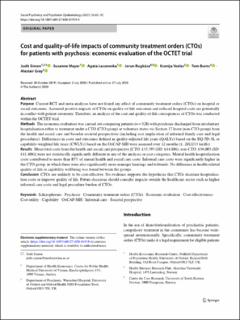| dc.contributor.author | Simon, Judit | |
| dc.contributor.author | Mayer, Susanne | |
| dc.contributor.author | Łaszewska, Agata | |
| dc.contributor.author | Rugkåsa, Jorun | |
| dc.contributor.author | Yeeles, Ksenija | |
| dc.contributor.author | Burns, Tom | |
| dc.contributor.author | Gray, Alastair | |
| dc.date.accessioned | 2021-04-06T12:17:02Z | |
| dc.date.available | 2021-04-06T12:17:02Z | |
| dc.date.created | 2020-10-30T13:20:06Z | |
| dc.date.issued | 2020 | |
| dc.identifier.citation | Simon, J., Mayer, S., Łaszewska, A., Rugkåsa, J., Yeeles, K., Burns, T. & Gray, A. (2021). Cost and quality-of-life impacts of community treatment orders (CTOs) for patients with psychosis: economic evaluation of the OCTET trial. Social Psychiatry and Psychiatric Epidemiology, 56(1), 85-95. | en_US |
| dc.identifier.issn | 0933-7954 | |
| dc.identifier.uri | https://hdl.handle.net/11250/2736399 | |
| dc.description.abstract | Purpose: Current RCT and meta-analyses have not found any effect of community treatment orders (CTOs) on hospital or social outcomes. Assumed positive impacts of CTOs on quality-of-life outcomes and reduced hospital costs are potentially in conflict with patient autonomy. Therefore, an analysis of the cost and quality-of-life consequences of CTOs was conducted within the OCTET trial.
Methods: The economic evaluation was carried out comparing patients (n = 328) with psychosis discharged from involuntary hospitalisation either to treatment under a CTO (CTO group) or voluntary status via Section 17 leave (non-CTO group) from the health and social care and broader societal perspectives (including cost implication of informal family care and legal procedures). Differences in costs and outcomes defined as quality-adjusted life years (QALYs) based on the EQ-5D-3L or capability-weighted life years (CWLYs) based on the OxCAP-MH were assessed over 12 months (£, 2012/13 tariffs).
Results: Mean total costs from the health and social care perspective [CTO: £35,595 (SD: £44,886); non-CTO: £36,003 (SD: £41,406)] were not statistically significantly different in any of the analyses or cost categories. Mental health hospitalisation costs contributed to more than 85% of annual health and social care costs. Informal care costs were significantly higher in the CTO group, in which there were also significantly more manager hearings and tribunals. No difference in health-related quality of life or capability wellbeing was found between the groups.
Conclusion: CTOs are unlikely to be cost-effective. No evidence supports the hypothesis that CTOs decrease hospitalisation costs or improve quality of life. Future decisions should consider impacts outside the healthcare sector such as higher informal care costs and legal procedure burden of CTOs. | en_US |
| dc.language.iso | eng | en_US |
| dc.rights | Navngivelse 4.0 Internasjonal | * |
| dc.rights.uri | http://creativecommons.org/licenses/by/4.0/deed.no | * |
| dc.title | Cost and quality-of-life impacts of community treatment orders (CTOs) for patients with psychosis: economic evaluation of the OCTET trial | en_US |
| dc.type | Peer reviewed | en_US |
| dc.type | Journal article | en_US |
| dc.description.version | publishedVersion | en_US |
| dc.rights.holder | © The Author(s) 2020. | en_US |
| dc.source.pagenumber | 85-95 | en_US |
| dc.source.volume | 56 | en_US |
| dc.source.journal | Social Psychiatry and Psychiatric Epidemiology | en_US |
| dc.source.issue | 1 | en_US |
| dc.identifier.doi | https://doi.org/10.1007/s00127-020-01919-4 | |
| dc.identifier.cristin | 1843611 | |
| cristin.ispublished | true | |
| cristin.fulltext | original | |
| cristin.qualitycode | 1 | |

